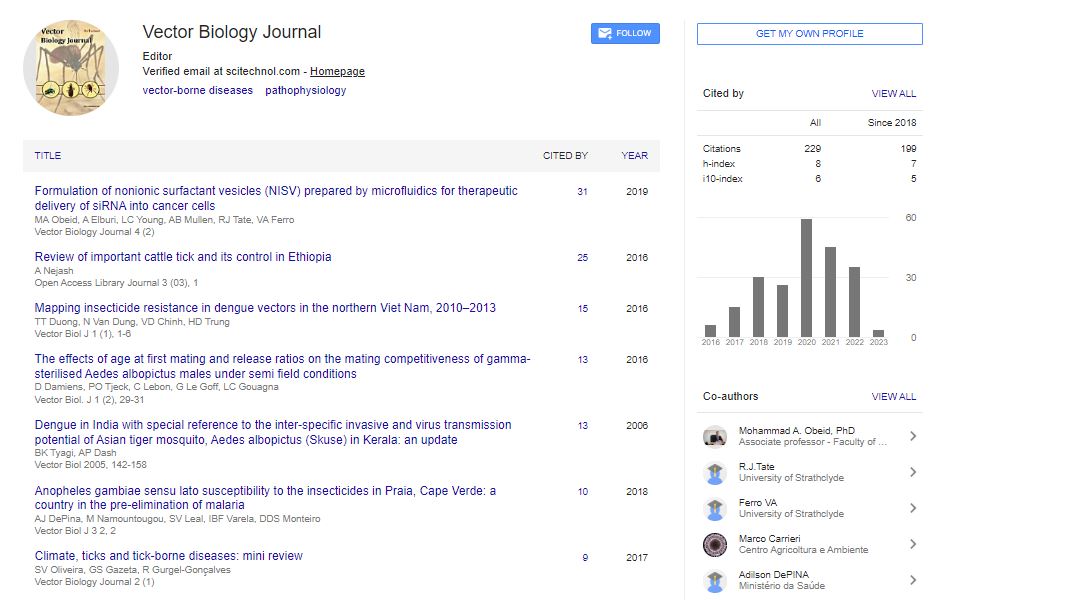Perspective, Vector Biol Vol: 8 Issue: 2
Major Impact of Malaria: Its Diagnostic and Treatment Challenges
Sorin Niculescu*
1Department of Health Sciences, University of Craiova, Craiova, Romania
*Corresponding Author: Sorin Niculescu,
Department of Health Sciences,
University of Craiova, Craiova, Romania
E-mail: nicul_escusorin@edu.ro
Received date: 30 May, 2023, Manuscript No. VBJ-23-107343;
Editor assigned date: 02 June, 2023, PreQC No. VBJ-23-107343 (PQ);
Reviewed date: 16 June, 2023, QC No. VBJ-23-107343;
Revised date: 23 June, 2023, Manuscript No. VBJ-23-107343 (R);
Published date: 30 June, 2023 DOI: 10.4172/2473-4810.1000269
Citation: Niculescu S (2023)Major Impact of Malaria: Its Diagnostic and Treatment Challenges. Vector Biol 8:2.
Description
Malaria is a life-threatening mosquito-borne disease caused by the Plasmodium parasite. It remains one of the most significant global health challenges, affecting millions of people each year, particularly in tropical and subtropical regions. Despite considerable progress in combating malaria over the past few decades, it continues to pose a significant threat to human health, socioeconomic development, and overall well-being. This note aims to provide an overview of malaria, its impact, prevention, and the need for urgent action to combat this disease.
Malaria is responsible for substantial morbidity and mortality worldwide, especially in sub-Saharan Africa, where over 90% of malaria-related deaths occur. According to the World Health Organization (WHO), there were an estimated 229 million cases of malaria and 409,000 deaths in 2019 alone. Pregnant women and young children are particularly vulnerable to severe complications and death from malaria infection. The disease places a tremendous economic burden on affected countries, resulting in reduced productivity, increased healthcare costs, and impeded economic growth.
Malaria is primarily transmitted through the bite of infected female Anopheles mosquitoes. Once inside the human body, the parasites travel to the liver, where they multiply and mature, eventually invading and destroying red blood cells. This cycle leads to the recurrent episodes of fever, chills, and flu-like symptoms commonly associated with malaria. If left untreated or misdiagnosed, malaria can progress to severe complications, such as cerebral malaria, organ failure, and even death.
Prevention and control
Efforts to prevent and control malaria involve a multi-faceted approach, including vector control, early diagnosis, prompt treatment, and research for developing effective vaccines. Insecticide-Treated bed Nets (ITNs) and Indoor Residual Spraying (IRS) are crucial strategies to reduce mosquito populations and protect individuals from mosquito bites, especially during peak transmission seasons. Other preventive measures include the use of antimalarial drugs, intermittent preventive treatment for pregnant women, and chemoprophylaxis for travelers to endemic areas.
Diagnostic and treatment challenges
Accurate and timely diagnosis of malaria is critical for effective treatment and disease surveillance. Microscopic examination of blood smears and rapid diagnostic tests (RDTs) are commonly used diagnostic methods, although they have limitations in terms of accuracy and availability. Treatment options for malaria include Artemisinin-based Combination Therapies (ACTs), which are currently the most effective drugs against the parasite. However, the emergence of drug-resistant strains of malaria in some regions poses a significant challenge to treatment efforts.
Research and innovation play an important role in the fight against malaria. Ongoing efforts aim to develop new antimalarial drugs, improve diagnostic tools, and advance vaccine candidates. Significant progress has been made in the development of the RTS,S/AS01 malaria vaccine, which has shown promising results in clinical trials. Continued investment in research and innovation is crucial to overcome the challenges posed by drug resistance and the complex nature of the parasite's life cycle.
Addressing the malaria burden requires sustained political commitment, strong partnerships, and adequate funding. The Roll Back Malaria (RBM) partnership, established in 1998, brings together governments, international organizations, civil society, and the private sector to coordinate efforts and advocate for malaria control. The Global Fund to Fight AIDS, Tuberculosis, and Malaria, along with other funding mechanisms, provides financial resources to support prevention, diagnosis, and treatment initiatives in endemic countries.
While progress has been made in reducing the global burden of malaria, the emergence of drug resistance, climate change, and health system challenges pose significant threats to these gains. The Corona Virus Disease (COVID-19) pandemic has further strained malaria control efforts, disrupting supply chains, reducing access to healthcare services, and diverting resources. To accelerate progress towards malaria elimination, there is an urgent need for increased political commitment, innovative strategies, and sufficient funding to strengthen health systems, improve access to essential interventions, and develop new tools and technologies.
Malaria continues to be a formidable global health challenge, affecting millions of people and hindering socioeconomic development in endemic regions. Combating malaria requires a comprehensive approach that includes prevention, early diagnosis, effective treatment, research, and global collaboration. Through sustained efforts, increased investment, and innovative solutions, it is possible to eliminate malaria and alleviate the suffering caused by this preventable and treatable disease. Urgent action is needed to make malaria a disease of the past and secure a healthier future for generations to come.
 Spanish
Spanish  Chinese
Chinese  Russian
Russian  German
German  French
French  Japanese
Japanese  Portuguese
Portuguese  Hindi
Hindi 